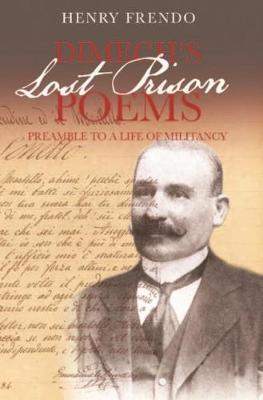Professor Henry Frendo, who unearthed the utterly unknown or tabu-ridden figure of Manuel Dimech (1860-1921) in three books between 1969 and 1972, and researched his non-repatriation from Egypt in 1918-1921 (2012), has struck on a new manuscript find which, he says, is "almost unbelievable."
This is a fascinating find of a former street urchin, orphan and ragamuffin, what Neapolitans would call a`scugnizzo', who had been apprehended for petty infringements several times, and who in 1878, at the age of 17, had landed a 20 year prison sentence for complicity in a brutal murder. But this new batch of manuscripts proves how, incredibly, within four years of his confinement at Kordin, this young man was composing poetry. Not only had he learned how to read and write in an impeccable orthography, but he embodied a remarkable sensitivity to what went on around him, including the insect and animal world, and an ability to philosophize on life, hope and human foibles. Not only that, he had mastered a literary command of three languages. His preferred language was Italian but he could also write well in French and in English, and had a smattering of Spanish.
Dimech's lost prison poems show him to be a romantic and a patriot as well as one harbouring deep religious sentiments. He was also an animal lover. Although his posture would become more ideological in time and with experience, Dimech's Lost Prison Poems already show Dimech's unbending support for the underdog, his aversion to hypocrisy, and his avowed fearlessness of`the powerful'. These are all traits that come out in an analysis of his prison poems, often sonnets, hence Frendo's subtitle for the book: `Prelude to a Life of Militancy'.
Dimech's Lost Prison Poems contains, for the first time, a substantive collection of Dimech's prison writings dating back to the early 1880s, most of them signed and dated in his own steady hand. There is a general analytical introduction in English with a contextual focus on thematics, accompanied by original textual reproductions and transcriptions, together with translations of letters in Spanish received by Dimech in prison from Gibraltar, followed by a name index.
In a back page comment sizing up this latest original work by Frendo, who directs the University's Institute of Maltese Studies, a leading litterateur and critic, Professor Oliver Friggieri, writes thus:"The publication of Manwel Dimech's prison poems constitutes a remarkable stage in the long intriguing process throughout which Henry Frendo has been revealing and reconstructing the complex image of this Maltese rebel. Frendo has gradually managed to define Dimech the man and the thinker in terms of what makes him what he now is: a definite point of reference on the path towards Malta's discovery and recognition of itself as a nation and a state. The various publications by Professor Frendo on Dimech have led to the positive evaluation of a man long forgotten and grossly misunderstood and underestimated. The discovery and publication of Dimech's prison poems will further show how consistently has Professor Frendo pursued his research even when it seemed that there were no more documents to be unearthed and no more facts to be narrated. This collection is indeed a revelation in all respects: it manifests Dimech's ability in handling Italian and poetic techniques, and highlights his fundamental beliefs, particularly his deep religious conviction and his respect for animals."
- ISBN10 9993274836
- ISBN13 9789993274834
- Publish Date 31 May 2014
- Publish Status Transferred
- Publish Country MT
- Imprint Midsea Books Ltd,Malta
- Format Hardcover
- Pages 128
- Language English
